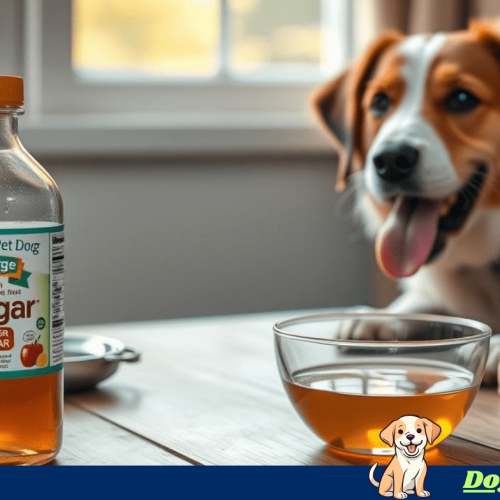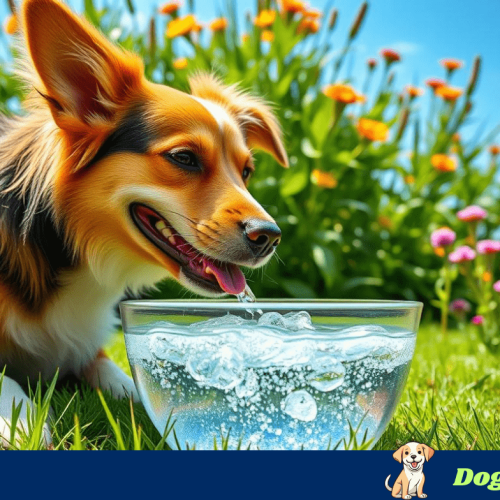Table of Contents
ToggleAlkaline Water Good for Dogs – Pet Health Guide
Is alkaline water good for dogs: We all want the best for our pets, including their health and happiness. Many dog owners wonder if alkaline water is suitable for their pets. Does it help with hydration, reduce acid reflux, and boost the immune system? Or are there risks we should know about before trying it?
Alkaline Water for Dogs: A Simple Guide: We will discuss its pros and cons. Here, you will discover pH and its pros and cons. We will also help you incorporate alkaline water into your dog’s diet safely. This is great information for dog owners, both new and experienced, to maintain their dogs’ health and hydration.
Key Takeaways
- Understand the difference between alkaline water and regular water
- Explore the potential benefits of alkaline water for dogs, such as improved hydration and reduced acid reflux symptoms
- Learn about the risks and concerns associated with giving alkaline water to dogs
- Discover factors to consider when deciding if alkaline water is right for your pet
- Get tips on how to introduce alkaline water into your dog’s diet safely
What is Alkaline Water?

Alkaline water is famous for its health benefits for humans and pets. Its pH levels make it different from regular water.
Understanding pH Levels in Water
The pH scale shows if water is acidic or alkaline. It goes from 0 to 14. A pH of 7 is neutral.
Many things can change water’s pH, including where the water comes from and the minerals in it. Some natural springs have higher pH levels because of minerals like calcium and magnesium.
How Alkaline Water Differs from Regular Water
Alkaline water has a higher pH than regular water. It is called ionized water for dogs and humans. Regular water has a pH of about 7, but alkaline water is eight or higher.
People say alkaline water helps with hydration and digestion and might also boost the immune system. But there’s not much science to back these claims up yet.
If you think about giving alkaline water to your dog, talk to your vet first. Some dogs might like it, but others might not need it or could get sick from it.
Potential Benefits of Alkaline Water for Dogs
Research on alkaline water for dogs is still new. But, some benefits include better hydration, less acid reflux, and a more robust immune system. Let us explore these possible advantages.
Improved Hydration
Alkaline water might help dogs stay hydrated better. Its smaller molecules could help cells absorb water more efficiently. This is good for dogs who get dehydrated quickly or are very active.
| Water Type | pH Level | Hydration Potential |
| Regular Tap Water | 6.5-8.5 | Moderate |
| Alkaline Water | 8.8-9.5 | High |
Reduced Acid Reflux Symptoms
Alkaline water might also help with acid reflux in dogs. Its higher pH could neutralize stomach acid. This could ease discomfort for dogs with sensitive stomachs or digestive problems.
Enhanced Immune Function
Some think alkaline water could boost a dog’s immune system. The idea is that it balances the body’s pH, supporting health and immunity. However, we need more studies to be sure.
These possible benefits are exciting, but we need more research. Always talk to your vet before changing your dog’s diet or how they drink water.
Risks and Concerns of Giving Alkaline Water to Dogs

Alkaline water might seem reasonable for dogs, but there are risks. It’s critical to know how it affects them. Can dogs safely drink this water?
Alkaline water can upset a dog’s natural balance. Dogs have a special way of digesting food, and drinking alkaline water can mess with their digestive system.
This can cause problems like:
- Gastrointestinal distress, including vomiting and diarrhoea
- Disruption of the normal gut flora, leading to digestive issues
- Interference with nutrient absorption, potentially causing deficiencies
- Increased risk of urinary tract infections due to altered urine pH
Little research exists on alkaline water for dogs. Some people say it’s okay, but there aren’t enough studies.
pH Level | Potential Effects on Dogs |
| 7.0 – 7.4 | Normal range for dogs, no significant concerns |
| 7.5 – 8.5 | Mildly alkaline, potential for minor digestive issues |
| 8.6 – 9.5 | Moderately alkaline, increased risk of health problems |
| 9.6 and above | Highly alkaline, significant concerns for dog’s well-being |
Dogs can handle their pH levels on their own. Giving them alkaline water might be better. Always talk to a vet before changing your dog’s diet or water.
Is Alkaline Water Good for Dogs?
Hydration is vital for your dog’s health. Alkaline water is a topic of interest for pet owners. But is it suitable for dogs? Let’s examine the factors and why you should talk to your vet.
Factors to Consider
Before giving your dog alkaline water, think about these things:
- Your dog’s overall health status
- Existing medical conditions or sensitivities
- Age and size of your dog
- Current diet and nutrition plan
These factors affect how your dog might react to alkaline water. It’s important to think about your dog’s needs and talk to a vet to see if alkaline water is right for them.
Consulting with Your Veterinarian
Your vet knows best about your dog’s health and hydration. They can give advice based on your dog’s needs and health history. Here are things to talk about with your vet:
| Discussion Points | Importance |
| Your dog’s current health status | Helps determine if alkaline water is appropriate |
| Potential benefits and risks | Allows for an informed decision |
| Recommended pH level | Ensures the water is safe and beneficial for your dog |
| Monitoring and adjustments | Enables ongoing evaluation of your dog’s response |
Talking to your vet lets you decide if alkaline water suits your dog.
How to Introduce Alkaline Water to Your Dog’s Diet

Adding alkaline water to your dog’s diet should be done slowly. A quick change can upset their stomach or make them not want to drink it. Slowly introducing alkaline water helps their body adjust and avoid terrible reactions.
Gradual Transition
Start by mixing a little alkaline water with their regular water. At first, use 25% alkaline water and 75% regular water. Slowly add more alkaline water over a week until it’s 50% each.
If they do well, keep adding more alkaline water. Eventually, you’ll have 100% alkaline water.
Here’s a sample transition schedule:
- Days 1-2: 25% alkaline water, 75% regular water
- Days 3-4: 50% alkaline water, 50% regular water
- Days 5-6: 75% alkaline water, 25% regular water
- Day 7 and beyond 100% alkaline water
Monitoring Your Dog’s Response
Keep a close eye on how your dog reacts to alkaline water. Look for changes in how they act, eat, or digest food. Signs they might not like it include:
- Diarrhea
- Vomiting
- Less water drinking
- Feeling tired
If you see these signs, stop the alkaline water. Talk to your vet. They can say if it’s good for your dog and suggest other ways to keep them hydrated.
Alternatives to Alkaline Water for Pet Hydration

Alkaline water might help dogs, but it’s not the only choice. There are other ways to keep your pet hydrated. Let’s look at two good options: filtered water and electrolyte-enhanced water.
Filtered Water
Filtered water is a great choice for dogs. It removes bad stuff from tap water, so your pet drinks clean water. It’s easy and helps keep your pet healthy.
- Type of filtration (carbon, reverse osmosis, etc.)
- Capacity and flow rate
- Compatibility with your water source
- Ease of maintenance and replacement
Electrolyte-Enhanced Water
Electrolyte-enhanced water is another good choice. It helps replace lost electrolytes. Electrolytes are essential for your dog’s muscles, nerves, and more.
This water is great for dogs in certain situations:
Situation | Benefit |
| Intense exercise or physical activity | Replaces electrolytes lost through sweating and panting |
| Hot weather conditions | Prevents dehydration and heat-related illnesses |
| Digestive issues or diarrhea | Helps replenish electrolytes lost due to fluid loss |
| Recovery from illness or surgery | Supports proper hydration and electrolyte balance during recovery |
When choosing electrolyte-enhanced water for your dog, pick a pet-specific product. Always talk to your vet to ensure it’s right for your dog.
Conclusion
Alkaline water for dogs has benefits and disadvantages. It might help your dog stay hydrated and feel better, but it’s very important to talk to a vet before giving it to your dog.
Your vet can help make sure your dog gets the proper water. They know what’s best for your dog’s health.
If you want to try alkaline water, start slow and watch how your dog reacts. If it’s not good, there are other options, like filtered water.
Every dog is different. What’s suitable for one might not be suitable for another. Always talk to your vet and consider your dog’s health first.
With the right care, your dog will stay happy and healthy and get the water it needs to thrive.
Freequently Asked Question About is alkaline water good for dogs
What is alkaline water, and how does it differ from regular water?
For the record, alkaline water is water with a pH above seven on the pH scale (a logarithmic scale from 0 to 14). Its alkalinity and minerals are believed to be beneficial to health. However, more research is needed to confirm this.
Can dogs drink alkaline water?
It is safe for dogs to drink alkaline water. Still, it is perhaps best to check with your vet first. Few dogs may not like high pH levels.
The possible advantages of providing alkaline water to dogs.
It can aid dogs’ hydration (alkaline water). It may also assist with acid reflux and increase their immune system performance. However, we need more research to understand this.
Is giving alkaline water safe for dogs?
Water with a high pH is not good for sick dogs. See for yourself how your dog will respond to alkaline water. If your dog appears to be unwell, please speak to your veterinarian right away.
What Are Some Precautions/How Can I Introduce Alkaline Water Into My Dog?
Introduce them first with a bit of alkaline water to their usual water. Observe how they manage things and gradually increase alkaline water. Always give them fresh water. If you’re concerned, check with your vet.
Aside from alkaline water, what else can I do to ensure my dog is drinking enough?
Yes, filtered water or water with electrolytes added. The important thing is to change your dog’s water regularly and keep it fresh and clean. Discuss what type of water is suitable for your dog with your veterinarian.











